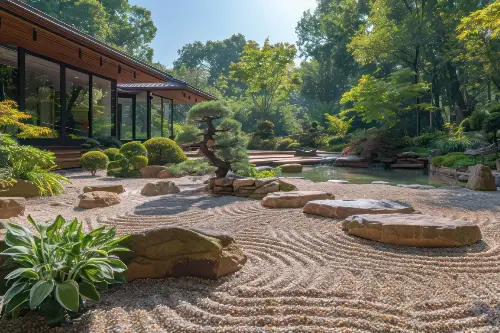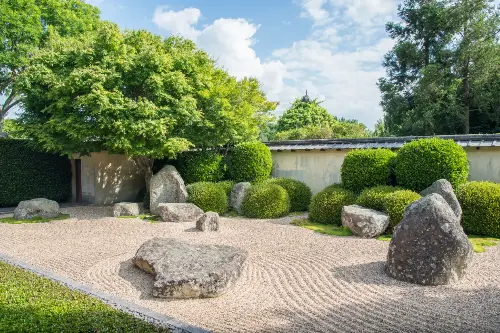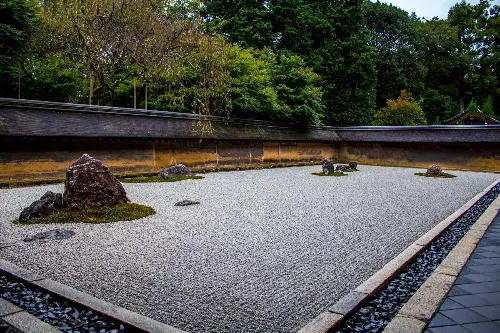Zen gardens, or Japanese rock gardens, offer a place of tranquillity, harmony, and meditation. Unlike the more typical Western botanical garden that focuses on floral aesthetics and variety, Zen gardens encapsulate simplicity and minimalism, providing a stark yet soothing elegance designed to encourage deep reflection and peace.

Origin and Philosophy Behind Zen Gardens
The inception of Zen gardens is linked closely with Zen Buddhism, introduced to Japan from China in the 12th century. These gardens were crafted at Zen Buddhist temples to aid in meditation and teaching. Central to their philosophy is the reflection of the inner landscape of one’s soul and the broader universe, through meticulously arranged stones, gravel, and occasionally, sparse vegetation.
Zen gardens embody the principle of 'kanso', which translates to simplicity or elimination of clutter. This principle is one of the highest ideals of Zen Buddhism, suggesting that real beauty and understanding come from a clear and unoccupied mind. These gardens are places where visitors can reach a state of Zen, which means feeling completely absorbed in the present moment, allowing for profound contemplation and inner peace.
Architectural Elements of Zen Gardens
A typical Zen garden consists of several key elements, each symbolising different aspects of nature and spirituality. Rocks of various sizes and shapes are the backbone of these gardens, symbolising islands, mountains, or animals depending on their placement and form. Gravel or fine sand, meticulously raked to represent water ripples or waves, encourages meditative thought. Careful consideration is given to the aesthetics, with each element placed with precision to represent nature in its most harmonious form.
Beyond these, moss and pruned trees or bushes sometimes populate these stark landscapes, introducing a subtle hint of life and growth. The simplicity of the garden's design invites those who enter to engage in Zen practices such as mindfulness and the dissolution of a busy mind.

Famous Zen Gardens to Explore
One of the most iconic Zen gardens worldwide is the Ryoan-ji Temple in Kyoto. This garden is famous for its karesansui, or dry landscape, which features fifteen carefully placed rocks on meticulously raked gravel. Intriguingly, the garden is designed so that one cannot view all fifteen rocks from any single vantage point within the temple, symbolising the concept of infinity and encouraging continued exploration and understanding.
Another remarkable example is the Daisen-in Temple garden, also located in Kyoto. This landscape garden tells the story of life with a river of pebbles winding through larger rock arrangements, epitomising a journey through various struggles and enlightenments.

The Experience and Impact of Visiting a Zen Garden
Visiting a Zen garden can be an antidote to the bustling pace of modern life. These gardens are intended to induce a meditative state, helping visitors clear their minds and soothe their souls. The minimalistic components allow for a focus on the texture, colour, and form of each element, engaging the senses in a very subdued yet intense way.
Guests often describe a visit to a Zen garden as a grounding experience, offering them a unique perspective on their thoughts and emotions. The visual simplicity of the landscape allows the mind to rest and the spirit to soar, facilitating a deeper connection with oneself and the surrounding nature.
Creating Your Own Zen Space
The beauty of Zen gardens is that they can be adapted to any size and setting. Creating your personal Zen garden involves selecting a quiet spot and using simple elements like rocks, sand, and a few plants. The aim is not to recreate the exact designs seen in Japan but to capture the spirit of tranquillity and minimalism emblematic of these spaces.
The process of raking the gravel in flowing patterns is meditative in itself, echoing the zen principles of mindfulness and concentration. As such, even the act of maintaining a Zen garden is thought to be a soothing ritual that can restore calm and focus.
Zen gardens blend art with philosophy. They are designed not just to please the eye, but to delve deep into the metaphysical, exploring concepts of simplicity, natural beauty, and inner peace. Whether you are strolling through the serene pathways of a large Zen garden or tending to your miniature version at home, these spaces provide a valuable lesson in harmony and personal balance, reflective of the profound wisdom of Zen traditions.
